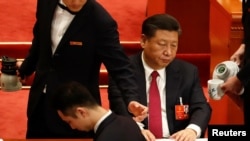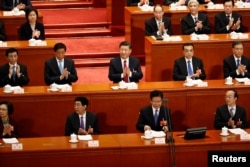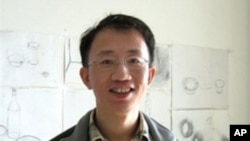On Sunday, China’s communist party rulers are expected to smoothly pass an amendment to the constitution that gives the country’s powerful leader Xi Jinping a mandate to serve as president for as long as he wishes, perhaps for life.
And while the proposal has sparked controversy domestically and abroad, there has been little sign of opposition or even concern from delegates of China’s largely rubber-stamp National People’s Congress, who will vote on the decision at the upcoming meeting.
During a review session for the proposed amendments this week, delegates had nothing but praise for Xi and the suggested amendments. At two separate sessions that VOA attended, none of the delegates mentioned the proposal to amend the president’s term in office specifically.
Although the term proposal has raised concerns that it gives Xi too much power and prominence, members of the Gansu delegation argued that the changes could help improve rule of law and belief in the constitution.
“The constitution provides us with security, happiness and fulfillment, which helps build up our greater respect to, firm belief in and recognition of the constitution,” said one delegate.
The current round of amendments is the largest in more than three decades since the current constitution was established. If approved – and there is little doubt that the proposals will not be passed – the changes will put an end to a once a decade leadership reshuffling process that has become a hallmark of Chinese politics and one of the few predictable elements of the country’s opaque political system.
The amendments will also add Xi Jinping’s political thought and vision to the document, a first for any Chinese leader in office since China’s founder Mao Zedong was in power.
Changes will also assert in clearer terms than ever the communist party’s absolute authority over all affairs and its position as the only political organization fit to rule China.
Although delegates and China’s communist party and state media insist that this round of amendments has received the public’s broad support, that claim is in sharp contrast to the actions authorities have taken at the same time to silence any discussion.
Dissidents arrested
Online Chinese censors have stepped up efforts to squash any debate and dissidents have been escorted or sent on vacation away from Beijing in an effort to keep them from speaking out.
Rights advocates say that one day before International Women’s Day, authorities in Wuhan detained two female activists, Huang Jingyi and Geng Caiwen, for making and posting a video online that mocked the constitutional reforms.
In the video, Huang acted like she was guiding a car in reverse saying: “Careful, backing up.” The phrase “backing up” or “going in reverse” has been banned from social media along with a number of other phrases including “constitutional amendments,” “I disagree” and “emperor.”
Critics of the changes argue that the constitutional amendments are a step backwards, not forward.
VOA has reached out to several dissidents who were sent on vacation.
One dissident who wished to remain anonymous confirmed he had been forced to leave Beijing and would not be allowed to return until meetings finish later this month.
“I'm not allowed to comment on the constitutional reform package. Actually, the whole country has been explicitly disallowed to criticize [the package]. I'm not alone," the dissident said.
Hu Jia, a dissident who has been sent on vacation outside of Beijing, said the controls were pervasive.
Hu said he would continue to speak out and despite authorities efforts to keep him and others silent. He said both the clause to explicitly legitimize one-party rule and scrap the two-term limit were unconstitutional.
“The term limit works as the only mechanism to have a check and balance of power on the top leader, who can only have a maximum of 10-year rule. Once it is scraped, there won’t be any other mechanism. He can stay in office for more than 10 years, even for life,” Hu said.
During the last round of constitutional amendments in 2004, proposed changes that were much smaller in scope than the current round of changes were allowed to be openly discussed by the public, and deliberations began more than a year before a vote took place. A detailed outline of the specific changes to the articles was released to the public more than two months before a vote was held.
The current round of amendments was decided behind closed doors when some 200 senior communist party officials gathered in Beijing in late January. Following the meetings, there was no mention of the proposed amendment to end limits on the president’s term in office. That was only revealed in late February, a week before the current meetings began.
In addition to voting on constitutional amendments, delegates as well as officials, who are elected or appointed during the current round of political meetings, will take part in oath taking ceremonies, the first time this has been done during the annual political meetings.
Wei Changhao, managing editor and founder of the website NPC Observer, said the ceremony itself will be largely a formality as delegates cannot be sued for dereliction of duty. But there could be a more general aim of having all those officials take an oath around the same time, during the meetings, he added.
“I think that the main reason is to at least show to the public that the party cares about the constitution,” Wei said. Also it “may be to instill in elected or appointed officials, some sort of awe, to remind them of their supposed mission.”
Wei said according to regulations for the ceremony, oath takers will place their left hand on the constitution and raise their right hand in a fist. China’s national anthem will also be played during the ceremony.






